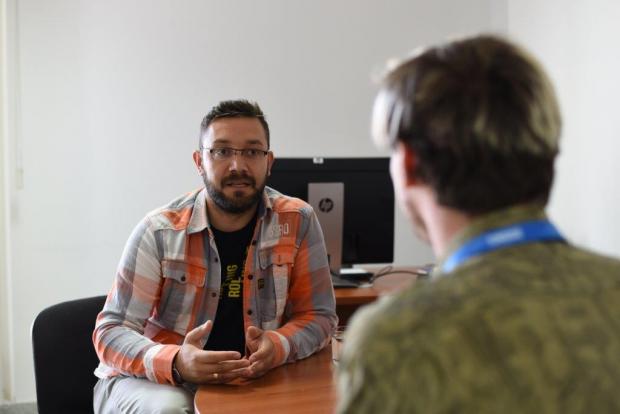Edis Galushi: Differences are part of us
This is the story of Edis Galushi, a young member of the Kosovo Roma community from the Prizren municipality. This story is part of a series of OSCE Mission in Kosovo articles on the struggles and achievements of successful individuals belonging to the Roma, Ashkali, and Egyptian communities in Kosovo. The OSCE Mission works with all communities in Kosovo to protect, promote and advance their rights.
We met Edis Galushi in the café of a quiet bookstore in Prizren. One of the first things he told us was that in Prizren, unlike other places in Kosovo and Europe, Roma were experiencing a renaissance thanks to the engagement of Roma intellectuals and stakeholders.
In 1989, the same year of Edis’ birth, a Roma Theatre was founded in Prizren as a forum for discussing social issues and transforming them into plays.
“The theatre contributed to the integration of Kosovo Roma into society,” says Edis. “The general public was exposed to the challenges faced by the community. It meant a lot at the time, and it means a lot today.”
Edis says that when it comes to the Roma language, the situation does not look quite as rosy. “Despite qualifying for status of a language in official use in Prizren, it still remains unrecognised.”
Nevertheless, Edis is not discouraged from promoting his culture and language. He is a professional translator and interpreter from Romani, having obtained a Master’s degree in English studies and English teaching.
“I was raised in Prizren’s unique cultural context and I decided to join the Roma Theatre at the age of 15,” says Edis. A decade later, Edis started writing monodramas — one of the hardest genres to perform on stage.
”My very first monodrama was titled Panta Rhei (‘Everything Flows’ in ancient Greek)”. It was a historical overview of the different migration routes taken almost a thousand years ago by Roma people from what is known today as north-eastern India,” explains Edis.
The play highlighted the most common stereotypes about Roma people. To set the stage for the narration across Roma history, different props were used (for example blacksmith tools and musical instruments) associated with Romani tribes.
“The play ends with books being set on fire,” says Edis. “It’s symbolic. Roma have always been written by non-Roma, either purposefully or accidentally feeding into century-old prejudices. When we are portrayed, we are never asked to contribute. I thought it was important to reveal that truth. At least my truth,” he says.
Education must come first
Edis has always strongly valued education. During high school, he learned fluent Bosnian alongside Roma, Albanian and English. He developed his English skills during a visit to the United States for the Leadership Development Program for Southeast Europe and he later gained a Bachelor’s degree in English language and literature, majoring in translation, at the University of Prishtinë/Priština.
Edis also attended Vilnius University on the ERASMUS programme and completed a Master’s degree at the University of Zagreb in English language, majoring in teaching English.
“My parents pushed me and my siblings very hard when it came to education,” he says. “We were encouraged to go far. University studies were our goal. But we were also taught the importance of supporting one another. My brother, who fled to Germany before the 1999 conflict, provided for the whole family and schooling.”
Recalling his time in Lithuania, Edis shared an interesting anecdote. According to one of his professors, he was the first Roma to attend Vilnius University. “Most likely I was simply the first one to speak openly about my culture without shame but rather with self-awareness.”
Richness of Roma Culture
When talking with Edis, one cannot help but notice and appreciate the vast knowledge he has of Roma history and culture. Besides being extremely fascinating and enriching, the history of the Roma community has deeper implications.

In Edis’ case, this knowledge provided self-awareness, which allowed him to gradually deconstruct the century-old prejudices, distorted image, and silenced history that the Roma themselves could not shake.
“In order to get rid of this ‘burden’ and fight back against social exclusion, awareness of the community’s past and present is crucial,” he says. “On the other hand, low self-awareness might have something to do with Roma of the Western Balkans often being subjected to prejudice throughout history, especially during the armed conflicts.”
For Edis, looking into the community’s history and nurturing cultural specificities does not mean disregarding or disrespecting others. “My identity is more than just that of a Roma community member. I am someone who completed secondary education in the Bosnian language and grew-up side by side with all the other communities residing in Prizren, embracing their respective cultures and languages. Differences are part of us,” he says proudly.
Culture and self-awareness as tools to thrive and find commonalities with others rather than used to draw separation lines; education to facilitate a dignified, empowered life; and cultivating open-mindedness and curiosity towards diversities – this is what Edis taught us during our conversation in that quiet bookstore in Prizren. And we thank him for that.

